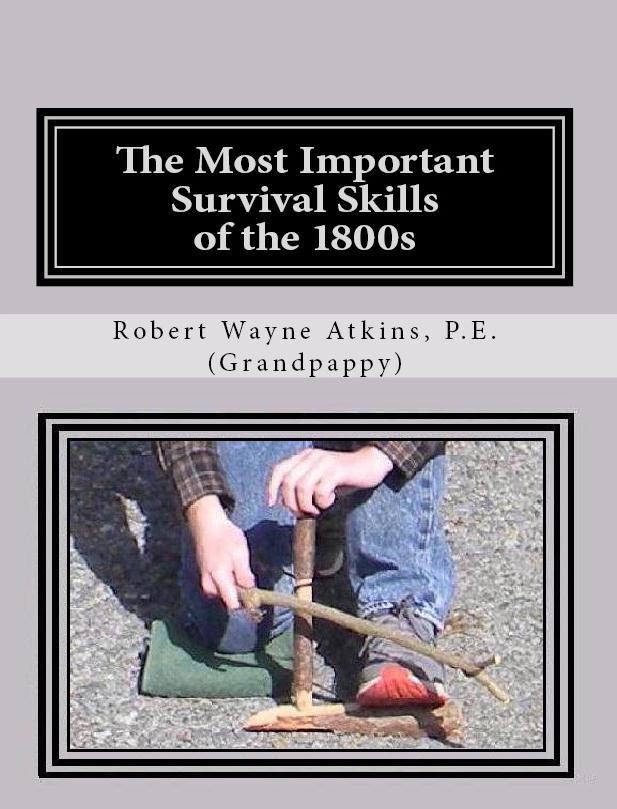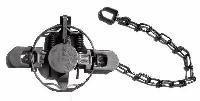| Chapter | | Page |
| | Section One: Tools and Weapons | |
| 1 | Knives | 1 |
| 2 | Hatchets and Tomahawks | 3 |
| 3 | Bow and Arrows | 4 |
| 4 | Spears and Clubs | 7 |
| 5 | Leather Slings | 8 |
| 6 | Ropes and Whips | 9 |
| 7 | Hand Tools | 11 |
| 8 | How to Sharpen Tools and Weapons | 12 |
| | Section Two: Primitive Skills | |
| 9 | How to Render Animal Fat | 13 |
| 10 | Soap | 15 |
| 11 | Candles | 25 |
| 12 | Clay Pottery | 29 |
| 13 | Sundials | 33 |
| 14 | Navigation | 35 |
| | Section Three: Fire | |
| 15 | The Importance of Fire | 38 |
| 16 | Types of Fire and Fire Safety | 39 |
| 17 | Tinder | 40 |
| 18 | Matches and Lighters | 41 |
| 19 | Flint, Friction, and Solar | 44 |
| 20 | Bow Drill | 45 |
| 21 | Fire from a Bullet | 53 |
| | Section Four: Fuel | |
| 22 | Wood | 54 |
| 23 | Natural Gas and Propane Gas | 56 |
| 24 | Coal, Coal Oil, and Kerosene | 58 |
| | Section Five: Cooking Options | |
| 25 | Campfires | 59 |
| 26 | Fireplaces | 61 |
| 27 | Cast Iron Stoves | 64 |
| 28 | Cast Iron Cookware | 65 |
| 29 | Dutch Ovens | 70 |
| 30 | Camp Ovens | 71 |
| 31 | Reflector Ovens | 72 |
| 32 | Solar Ovens | 75 |
| | Section Six: Water | |
| 33 | Water Importance | 77 |
| 34 | Water Sources | 78 |
| 35 | Water Purification | 81 |
| 36 | Water Storage | 86 |
| | Section Seven: Fish and Meat | |
| 37 | Primitive Fishing Techniques | 89 |
| 38 | Gill Nets | 90 |
| 39 | Traps and Snares | 97 |
| 40 | Skinning and Butchering | 100 |
| 41 | Other Edible Creatures | 103 |
| | Section Eight: Edible Wild Plants | |
| 42 | Edible Wild Plants | 104 |
| 43 | Acorns | 109 |
| 44 | Hickory Nuts | 117 |
| | Section Nine: Gardens and Orchards | |
| 45 | Criteria for Selecting Vegetable Seeds | 119 |
| 46 | How to Grow Vegetables | 121 |
| 47 | Crop Rotation and Mulch | 125 |
| 48 | How to Grow Your Own Seeds | 127 |
| 49 | Seed Harvesting and Storage | 135 |
| 50 | Fruits, Nuts, Grapes, and Berries | 137 |
| 51 | Fruit Trees From Seed | 146 |
| | Section Ten: Food Preservation | |
| 52 | Food Safety | 149 |
| 53 | Smokehouses | 150 |
| 54 | Root Cellars | 155 |
| 55 | Drying Food | 156 |
| 56 | Parched Corn and Rockahominy | 158 |
| 57 | Meat Jerky | 160 |
| 58 | Pemmican | 162 |
| | Section Eleven: Farm Animals | |
| 59 | Chickens and Rabbits | 165 |
| 60 | Cows and Goats | 166 |
| 61 | Horses, Ponies, and Mules | 167 |
| | Section Twelve: Health and Hygiene | |
| 62 | Honey | 168 |
| 63 | Apple Cider Vinegar | 169 |
| 64 | Herbal Home Remedies | 171 |
| 65 | Insect Bites and Skunk Deodorizer | 173 |
| 66 | Head Lice | 174 |
| 67 | Aspirin | 178 |
| 68 | How to Wipe Without Toilet Tissue | 181 |
| | Index | 182 |
| | About the Author | 184 |







































 My life experiences include approximately six months living deep in the backwoods of Maine with my wife and our three small preschool age children from June to November of 1975 while I was building a rustic log cabin using pine trees that grew on the 12 acres of land we had purchased. I wore a pistol every day while I was building our cabin in that primitive wilderness environment. I hunted with a bolt-action rifle and I used steel traps to capture wild game animals. We cooked our meals over a campfire every day. After returning to "civilization" in late November of 1975 I continued to study about pioneer life and the primitive survival skills that were widely used in the 1800s. Since 1975 I have actually used a wide variety of "primitive skills" and I have accumulated a tremendous amount of practical hands-on knowledge and experience on each of these skills. And it has all been tempered by my actual experience of living a primitive existence in the backwoods of Maine during the summer and fall of 1975.
My life experiences include approximately six months living deep in the backwoods of Maine with my wife and our three small preschool age children from June to November of 1975 while I was building a rustic log cabin using pine trees that grew on the 12 acres of land we had purchased. I wore a pistol every day while I was building our cabin in that primitive wilderness environment. I hunted with a bolt-action rifle and I used steel traps to capture wild game animals. We cooked our meals over a campfire every day. After returning to "civilization" in late November of 1975 I continued to study about pioneer life and the primitive survival skills that were widely used in the 1800s. Since 1975 I have actually used a wide variety of "primitive skills" and I have accumulated a tremendous amount of practical hands-on knowledge and experience on each of these skills. And it has all been tempered by my actual experience of living a primitive existence in the backwoods of Maine during the summer and fall of 1975.
